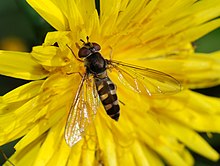Meliscaeva auricollis
| Meliscaeva auricollis | |
|---|---|

| |
| Male | |

| |
| Female | |
| Scientific classification | |
| Domain: | Eukaryota |
| Kingdom: | Animalia |
| Phylum: | Arthropoda |
| Class: | Insecta |
| Order: | Diptera |
| Family: | Syrphidae |
| Genus: | Meliscaeva |
| Species: | M. auricollis
|
| Binomial name | |
| Meliscaeva auricollis (Meigen, 1822)
| |
| Synonyms | |
|
List
| |
Meliscaeva auricollis is a West Palearctic species of hoverfly.[1]
Description[edit]
External images
For terms see Morphology of Diptera
Wing length 6-9·5 mm. Elongated body. Lunula yellow with a black mark above it. Facial knob or more black; wing. Alula triangular. Tergite 2 usually with small elongate yellow marks, or small triangular marks. Tergites 3 and 4 with a pair of spots or narrowly connected bands. Elongated body. The male terminalia are figured by Hippa (1968).[2] Larva described and figured by Rotheray (1994).[3]
See references for determination.[4]
[5][6][7]

Distribution[edit]
Palearctic Fennoscandia South to Iberia, the Mediterranean basin. Ireland East through Europe into European parts of Russia and Turkey. [8] [9]
Biology[edit]
Habitat: Deciduous, broad-leaved evergreen and coniferous forest. Flowers visited include white umbellifers, Arbutus unedo, Chaerophyllum, Euonymus, Euphorbia, Filipendula, Hedera, Rubus, Salix, Sorbus, Viburnum opulus.[10] The flight period is March to October (earlier and longer in southern Europe). The larva feeds on aphids or pysillids on trees.
References[edit]
- ^ Stubbs, Alan E. & Falk, Steven J. (1983). British Hoverflies: An Illustrated Identification Guide. British Entomological & Natural History Society. pp. 253, xvpp.
- ^ Hippa, H. (1968) A generic revision of the genus Syrphus and allied genera (Diptera: Syrphidae) in the Palearctic region, with descriptions of the male genitalia. Acta Ent.Fenn., 25: 1-94.
- ^ Rotheray G., 1993 Colour Guide to Hoverfly Larvae Diptera, Syrphidae in Britain and Europe Dipterists Forum pdf
- ^ Van Veen, M. (2004) Hoverflies of Northwest Europe: identification keys to the Syrphidae. 256pp. KNNV Publishing, Utrecht.addendum
- ^ Van der Goot,V.S. (1981) De zweefvliegen van Noordwest - Europa en Europees Rusland, in het bijzonder van de Benelux. KNNV, Uitgave no.32: 275pp. Amsterdam.
- ^ Bei-Bienko, G.Y. & Steyskal, G.C. (1988) Keys to the Insects of the European Part of the USSR, Volume V: Diptera and Siphonaptera, Part I. Amerind Publishing Co., New Delhi. ISBN 81-205-0080-6.
- ^ Coe, R.L. (1953) Diptera: Syrphidae. Handbks.ident.Br.insects, 10(1): 1-98. R.ent.Soc.London. pdf
- ^ Fauna Europaea
- ^ Peck, L.V. (1988) Syrphidae. In: Soos, A. & Papp, L. (eds.) Catalogue of Palaearctic Diptera, 8: 11-230. Akad.Kiado, Budapest.
- ^ de Buck, N. (1990) Bloembezoek en bestuivingsecologie van Zweefvliegen (Diptera, Syrphidae) in het bijzonder voor België. Doc.Trav. IRSNB, no.60, 1-167.
